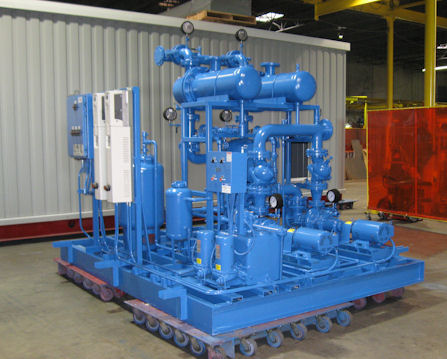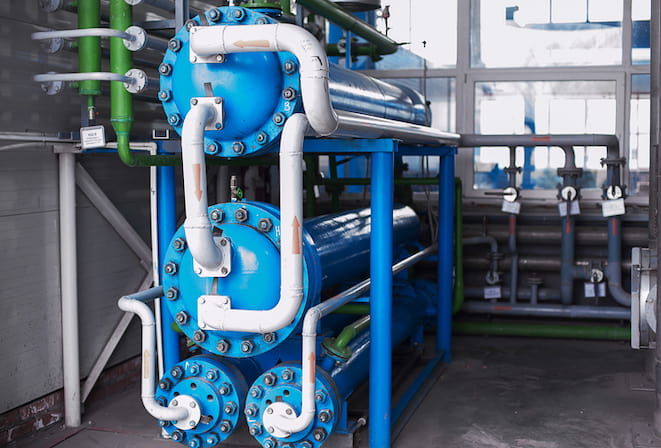DVS Heat Transfer Systems: A Complete Guide to Smarter IoT Integration
Wiki Article
The Role of Heat Transfer Systems in Sustainable Energy Solutions for the Future
Heat transfer systems are necessary in the mission for lasting power options. They enhance thermal power management, boosting the effectiveness of eco-friendly technologies. By using devices like convection, transmission, and radiation, these systems minimize energy losses. Their function in solar thermal and geothermal applications is specifically considerable. As technologies arise, the potential for more improvements raises essential questions concerning future energy strategies. What growths will shape the landscape of sustainable power?Comprehending Heat Transfer Solutions

The Relevance of Thermal Energy Management
Effective thermal power management is crucial for making the most of power efficiency and lessening waste in various systems. By controling temperature level and enhancing Heat transfer processes, companies can considerably minimize energy usage and operational costs. Efficient monitoring entails the application of innovative innovations and methods that check and control thermal problems within systems, ensuring that energy sources are made use of successfully. On top of that, correct thermal power monitoring contributes to minimizing greenhouse gas emissions, straightening with worldwide sustainability goals. It additionally improves system integrity and performance, leading to enhanced item high quality and longer devices lifespan. Eventually, prioritizing thermal energy monitoring is a crucial action in the direction of developing much more lasting power services and cultivating a responsible method to energy usage in domestic and commercial contexts.Applications of Heat Transfer in Renewable Resource
While numerous renewable power sources promise sustainability, the reliable application of Heat transfer plays a necessary role in their efficiency. In wind power systems, Heat transfer is made use of for generator element cooling, boosting efficiency and longevity. Geothermal power depends on effective Heat exchange in between the planet's subsurface and the fluid distributing in the system, taking full advantage of power removal. Biomass energy procedures additionally gain from Heat transfer, as it helps in converting natural products right into useful fuel via pyrolysis and gasification. Additionally, in hydropower, maintaining optimal temperature levels in reservoirs can enhance power outcome. Each of these applications shows the important value of Heat transfer systems in boosting sustainable energy modern technologies, ultimately adding to a much more sustainable power future.Enhancing Solar Thermal Power Efficiency
As solar thermal power systems continue to progress, boosting their performance has come to be vital for making best use of energy result. Developments in Heat transfer innovations, such as boosted thermal storage products and innovative Heat exchangers, play a significant function in improving efficiency. By utilizing sophisticated products that have superior thermal conductivity, systems can transfer and record Heat much more properly. Additionally, integrating radar that comply with the sunlight's course assurances that collectors receive ideal solar exposure throughout the day. Making use of nanotechnology in solar absorbers can even more boost energy absorption rates. Furthermore, integrating computerized control systems aids take care of and regulate temperatures energy distribution successfully, bring about minimized losses and enhanced general system performance. These improvements lead the way for more sustainable solar thermal energy services in the future.Geothermal Heating: A Sustainable Solution
Geothermal heating provides a sensible alternative for lasting energy, providing considerable ecological benefits through reduced greenhouse gas discharges. Its performance and cost-effectiveness make it an appealing alternative to conventional heating unit. Obstacles connected to implementation should be dealt with to optimize its prospective effect.Ecological Benefits of Geothermal
Typical home heating methods contribute substantially to greenhouse gas discharges, geothermal home heating offers an engaging option that decreases environmental impact. By using the Earth's internal Heat, geothermal systems make use of an eco-friendly energy source, significantly decreasing reliance on fossil gas. This technique generates minimal carbon emissions, making it a cleaner choice for business and household heating. Furthermore, geothermal systems advertise energy effectiveness, as they call for less power compared to conventional furnace. DVS Heat Transfer Systems. The use of geothermal energy likewise helps in reducing air contamination, enhancing regional air quality and public wellness. As a lasting option, geothermal home heating supports climate change mitigation initiatives, positioning itself as an essential component in the shift towards a greener futureEfficiency and Cost-Effectiveness
How does geothermal heating measure up in terms of performance and cost-effectiveness compared to traditional heating systems? Geothermal home heating shows exceptional effectiveness, often accomplishing a coefficient of performance (POLICE) of 3 to 5, suggesting it generates 3 to 5 devices of Heat for every single unit of electrical power eaten. This effectiveness translates into lower operating expenses, particularly in areas with steady geothermal sources. Initial installment prices can be greater than conventional systems; nonetheless, long-lasting cost savings on energy expenses and decreased maintenance expenditures can balance out these in advance financial investments. Furthermore, many governments incentivize geothermal systems via rebates and tax credit histories, enhancing their cost-effectiveness. In general, geothermal heating emerges as a lasting and economically viable alternative to even more conventional heating remedies.Application Difficulties and Solutions
Countless difficulties can restrain the widespread execution of geothermal heater, regardless of their clear advantages as a lasting power service. High initial installment costs often discourage home owners and financiers, making funding a considerable obstacle. Additionally, the geographical limitations of appropriate geothermal sites limit availability in certain regions. Neighborhood regulations and permitting procedures can additionally complicate job growth, leading to delays. Additionally, public recognition and understanding of geothermal systems continue to be low, preventing acceptance. To resolve these challenges, targeted education campaigns can enhance open secret, while government motivations can reduce monetary problems. Collaborating with regional authorities to simplify regulations may help with smoother job approvals, ultimately promoting the adoption of geothermal Check This Out heating as a practical, sustainable energy option.Advancements in Heat Transfer Technologies
Advancements in Heat transfer innovations play a crucial function in enhancing energy efficiency and sustainability. Advanced Heat exchangers and phase change products go to the center of these advancements, supplying substantial enhancements in thermal administration. These technologies not only maximize energy use but likewise add to reducing ecological effect in various applications.Advanced Heat Exchangers
Advanced Heat exchangers play a necessary function in enhancing power effectiveness across various applications in lasting energy remedies. These gadgets help with the transfer of Heat between two or even more fluids, significantly reducing power usage in procedures such as commercial heating, air conditioning, and power generation. Technologies in products and layout, such as making use of nanofluids and small configurations, have actually resulted in improved thermal efficiency and decreased dimension demands. In addition, developments in electronic tracking and control systems enable optimized operation, more enhancing performance. By reducing waste Heat and making best use of power recuperation, advanced Heat exchangers contribute to lower carbon impacts and sustain the shift toward eco pleasant technologies. Their continued growth is vital for accomplishing international energy sustainability goals.
Stage Adjustment Materials
The combination of stage change materials (PCMs) right into Heat transfer modern technologies represents a considerable advancement in energy administration and performance. PCMs soak up and release thermal energy during their stage adjustments, enabling effective temperature policy in building products and power systems. By storing excess Heat during top periods and launching it when need increases, PCMs add to fill changing and energy conservation - DVS Heat Transfer Systems. This capability enhances the efficiency of renewable resource systems, particularly in solar thermal applications. Additionally, PCMs can improve the thermal comfort of interior atmospheres, reducing reliance on conventional home click to investigate heating and cooling techniques. As developments in PCM formulations proceed to arise, their duty in sustainable power remedies is positioned to expand, offering appealing methods for future research and application
Future Potential Customers for Heat Transfer in Lasting Energy
As the need for sustainable energy remedies proceeds to rise, the function of Heat transfer systems is coming to be increasingly vital in forming future modern technologies. Advancements in materials and styles are anticipated to improve performance in Heat transfer, lowering energy losses in numerous applications. The assimilation of sophisticated thermal storage space systems, such as stage modification products and thermochemical storage space, will enable far better management of power resources. Research study right into nanofluids and biomimetic Heat exchangers might better maximize thermal efficiency. Additionally, the fostering of clever innovations will enable real-time surveillance and flexible control of Heat transfer procedures. These advancements are poised to significantly add to the overall effectiveness and sustainability of energy systems, leading the way for a much more energy-efficient future.Regularly Asked Questions
Just How Can People Apply Heat Transfer Solution in your home?

Individuals can execute Heat transfer systems in your home by installing energy-efficient appliances, making use of radiant home heating, and enhancing insulation. These procedures boost energy efficiency, minimize expenses, and promote lasting techniques in property environments.

What Are the Costs Linked With Installing Heat Transfer Systems?
The costs related to installing Heat transfer systems vary extensively, generally encompassing devices, installment labor, and maintenance. Factors such as system type, home size, and neighborhood policies significantly influence the overall expenditure included.Exist Federal Government Motivations for Heat Transfer System Installations?
Government motivations for Heat transfer system installations differ by region and can consist of tax credit histories, grants, and rebates. These economic advantages intend to encourage fostering, ultimately promoting energy performance and minimizing environmental impact within neighborhoods.Just How Do Heat Transfer Solutions Effect Power Costs?
Heat transfer systems notably affect power bills by optimizing power efficiency. By enhancing the transfer of Heat, these systems lower power consumption, causing reduced energy prices and developing an extra sustainable strategy to power management.What Upkeep Is Required for Heat Transfer Solutions?
Maintenance for Heat transfer systems consists of normal inspections, cleaning of parts, inspecting liquid levels, making certain proper insulation, and changing worn components. These tasks assist keep performance, prevent break downs, and lengthen the system's functional life expectancy.These systems assist in the movement of thermal power from one tool to one more, making it possible for the transfer of Heat for energy, home heating, or cooling additional resources generation objectives. Geothermal power depends on effective Heat exchange in between the planet's subsurface and the liquid flowing in the system, taking full advantage of energy extraction. Additionally, geothermal systems promote energy efficiency, as they call for much less power compared to traditional home heating systems. Advanced Heat exchangers play an important function in improving power efficiency throughout various applications in sustainable energy options. Heat transfer systems notably affect power expenses by optimizing energy performance.
Report this wiki page